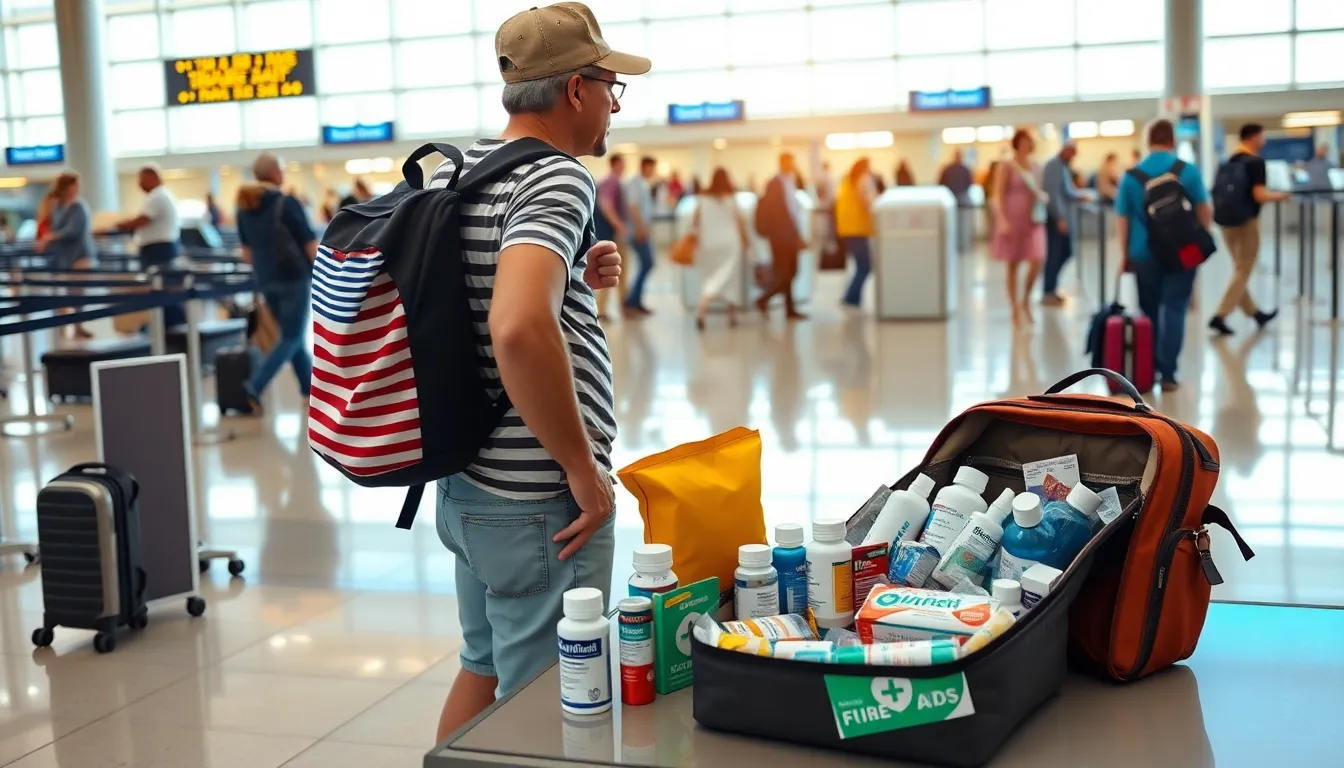Traveling can be a thrilling adventure, but it can also feel like a game of dodgeball with germs and unhealthy habits. Whether it’s that questionable street food or the mysterious hotel bedspread, travelers often find themselves in a health minefield. But fear not! With a few savvy health tips, anyone can navigate the globe without having to trade in their passport for a bottle of hand sanitizer.
Imagine this: you’re sipping a piña colada on a sunny beach, not worrying about whether you’ll be spending your vacation in the bathroom. By following some simple health guidelines, you can enjoy your travels while keeping your body in tip-top shape. Let’s dive into the must-know health tips that’ll have you feeling like a globetrotting superhero, ready to conquer every destination with a smile and a healthy glow.
Table of Contents
ToggleEssential Health Tips For Travelers
Travelers face various health challenges while exploring new places. Prioritizing hydration is crucial; consuming at least 2 to 3 liters of water daily helps maintain optimal hydration levels. Staying aware of local food safety practices enhances protection from foodborne illnesses. Eating well-balanced meals rich in fruits and vegetables supports the immune system.
In addition, staying active can improve overall health. Incorporating regular exercise, like walking or cycling, into daily itineraries boosts energy levels and enhances mood. Adequate rest is vital too; aiming for 7 to 8 hours of sleep each night promotes recovery and resilience against stress.
Packing a travel health kit is highly recommended. Essential items may include medications, first-aid supplies, hand sanitizer, and insect repellent. Familiarizing oneself with local healthcare facilities ensures quick access to medical assistance if necessary.
Adjusting to different time zones can impact sleep patterns. Gradually shifting sleep schedules a few days before departure helps when managing jet lag. Practicing mindfulness techniques like deep breathing or meditation can alleviate travel-related stress.
Vaccinations shouldn’t be overlooked; ensuring all routine vaccines are up to date significantly lowers the risk of illnesses. Researching destination-specific vaccines or preventative treatments provides added safety. Embracing these health tips enables travelers to enjoy adventure while keeping well-being in focus.
Preparing For Your Trip

Prioritizing health before traveling is essential for a smooth experience. Ensuring vaccinations and health insurance coverage can safeguard travelers against potential risks.
Vaccinations And Health Insurance
Checking vaccination requirements for the destination helps mitigate health risks. Travelers should keep immunizations up to date and consider receiving vaccines specific to certain regions. Researching health insurance options allows travelers to access necessary medical care if needed. Confirming that coverage includes overseas treatment guarantees peace of mind while exploring. Understanding the healthcare system in the destination also aids in navigating any emergencies effectively.
Packing Health Essentials
Packing a travel health kit serves as a safety net during a trip. Including over-the-counter medications like pain relievers, antihistamines, and digestive aids covers common ailments that may arise. Additionally, travelers should pack hand sanitizer and disinfectant wipes to maintain hygiene. Remembering to bring a reusable water bottle promotes hydration and helps avoid purchasing potentially unsafe water. Lastly, including basic first aid supplies addresses minor injuries or ailments promptly, facilitating a hassle-free adventure.
Staying Healthy During Travel
Traveling can be exciting yet stressful, so adopting effective strategies for managing stress and maintaining nutrition is essential for overall well-being.
Managing Stress And Anxiety
Managing stress and anxiety during travel makes the experience more enjoyable. Prioritizing mindful practices like deep breathing exercises helps reduce tension. Engaging in light physical activity, such as walking or stretching, enhances mood and alleviates stress. Keeping a journal or practicing gratitude can also provide emotional relief. Staying connected with loved ones through calls or messages fosters support, serving as an effective coping mechanism. Exploring local hobbies or activities may distract from travel-related stress, allowing for a more relaxed approach. Utilizing guided meditation apps supports mental wellness, offering moments of tranquility amid busy itineraries.
Nutrition And Hydration
Nutrition and hydration play critical roles in maintaining health while traveling. Drinking at least 2 to 3 liters of water each day supports hydration levels, especially in varying climates. Choosing meals rich in fruits and vegetables bolsters the immune system and provides necessary nutrients. Selecting fresh, local dishes enhances nutritional quality and supports local economies. Preparing snacks, such as nuts or granola bars, offers convenient options during excursions. Staying mindful of food safety practices prevents foodborne illnesses, ensuring a safe culinary experience. Balancing meals throughout the day sustains energy levels, supporting both physical and mental well-being while enjoying the journey.
Dealing With Common Travel Ailments
Traveling often presents unique health challenges. Addressing common ailments effectively helps travelers maintain their well-being.
Motion Sickness And Jet Lag
Motion sickness can disrupt travel, especially on long journeys. To mitigate symptoms, travelers can consider over-the-counter remedies like meclizine. Keeping eyes on stable objects, like the horizon, provides relief. Jet lag often follows long flights. Adjusting sleep schedules before departure supports the body’s natural rhythms. During travel, staying hydrated aids in reducing fatigue. Light physical activity on arrival can also ease the transition.
Traveler’s Diarrhea
Traveler’s diarrhea frequently affects those exploring new destinations. To minimize risk, avoiding street food and drinking bottled water is advisable. Travelers should wash hands regularly to prevent the onset of bacteria. In case symptoms arise, rehydration solutions are essential for recovery. Access to over-the-counter medications like loperamide can alleviate discomfort. Maintaining a balanced diet rich in fruits and vegetables strengthens immunity while abroad. Keeping these strategies in mind helps ensure a healthier travel experience.
Staying Safe And Informed
Travelers must stay informed about potential health risks to ensure a safe journey. Researching a destination’s health environment is crucial for planning. Check reliable sources such as the Centers for Disease Control and Prevention (CDC) or the World Health Organization (WHO) for area-specific guidelines. Local health departments often report on outbreaks and necessary vaccinations. Understanding the common diseases prevalent in specific areas can help travelers take necessary precautions. Awareness of food safety practices prevents foodborne illnesses during travels.
Keeping essential contact information close at hand provides peace of mind during trips. Maintain a list of local healthcare facilities, doctors, and hospitals for emergencies. Not knowing where to go can heighten stress levels in unfamiliar places. Storing emergency contacts in a mobile device makes them easily accessible. Travelers should also save the contact information for their country’s embassy or consulate. This can help them access assistance in various situations, from lost passports to urgent health concerns.
Conclusion
Traveling can be an enriching experience but maintaining health is essential for enjoyment. By staying hydrated and making informed food choices travelers can significantly reduce health risks. Regular exercise and adequate rest play key roles in keeping energy levels high while managing stress is crucial for a smooth journey.
Packing a travel health kit and knowing local healthcare options can provide peace of mind. Staying updated on vaccinations and understanding destination-specific health concerns further enhances safety. With these tips in mind travelers can embark on their adventures confidently prioritizing their well-being. Embracing a proactive approach to health ensures that every trip is memorable for all the right reasons.



